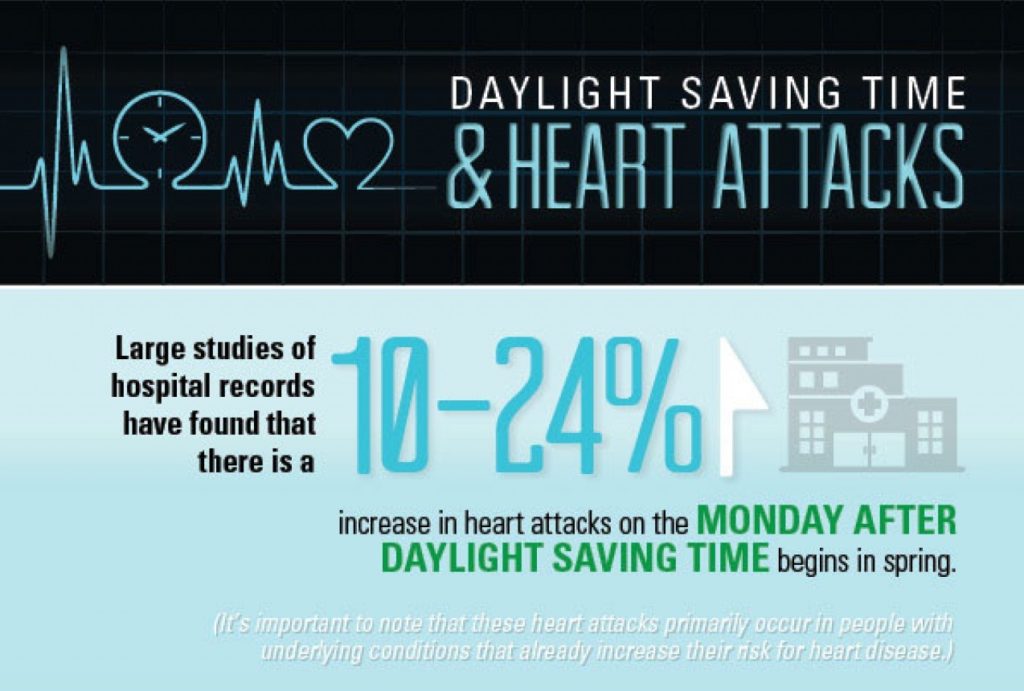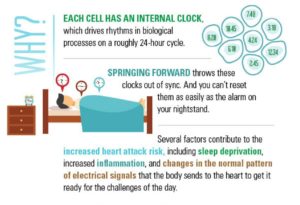Daylight Saving Time: Helpful or Hurtful?
This past Sunday, we changed our clocks ahead one hour to “spring forward” to daylight. Daylight saving time was enacted in the United States after WW1 partially to conserve energy. Back then, incandescent bulbs used a lot of energy, and moving the work day into the day time was thought to be a good idea. However, in later years bulbs changed to fluorescents and saving energy was questionable as the cost of air conditioning the workplace an hour longer each day increased.
Others thought that switching the clocks may help children or farmers. However, the time change does not prevent children from walking in the dark to school buses, because in fact, moving the clock forward during the spring or summer makes it darker, not lighter. Others may claim that farmers would have a longer day at the end of the day and can therefore get more work accomplished; however, that is not correct because, in fact, farmers get most of their work done early in the morning when the animals arise and, therefore, would prefer for the animals to wake up at the normal hour, not an hour later.
The policy for changing the clock from standard time to daylight saving time and back again is currently under legislative review. There are multiple proposals to terminate our time switching, such as the Sunshine Protection Act which has been raised by Florida Senator Marco Rubio and which favor having Daylight Saving Time year-round.
Effects of Time Change
Proponents of this Act claim that there are health issues with switching the clock back and forth, including changes in sleep patterns and feeling a bit “off” while adjusting to the new time.

Courtesy University of Alabama

Courtesy University of Alabama
However, retailers, as well as companies that provide outdoor adventures and activities, are most in favor of Daylight-Saving Time. Why? Outdoor theme parks and ski areas both huge industries make an extra few billion dollars a year due to the simple hourly shift of time. And, typically retailers favor having sunlight longer because more of us partake in shopping.
Real Estate and Daylight
I would imagine that the National Realtors Association would be in favor of the Sunshine Protection Act because it would allow for more time during the day to see a residential or commercial property. Also, daylight helps in taking photos of properties.
Keeping the status quo and switching the clocks may impact real estate as it alters one’s biological clocks, creating a substantial impact—just due to the loss of one hour of sleep. Whether that feeling of being “off” prevents one from dealing rationally in a real estate transaction, or not being productive in negotiating a residential or commercial contract, our emotional state may not be optimum.
So, as you look for an additional cup of coffee, consider whether switching or shifting time twice a year continues to make sense. It may in fact make more sense to keep the days the same throughout the year.
Original source: https://southfloridalawblog.com/spring-forward-time-change-and-the-real-estate-market/
From the trenches,
Roy Oppenheim.
Oppenheim Law | Real Estate Attorneys Fort Lauderdale
2500 Weston Rd #404
Fort Lauderdale, FL 33331
954-384-6114
Email: contactus@oplaw.net
Website: https://www.oppenheimlaw.com
About Roy:
Roy Oppenheim is a sought-after legal expert on issues relating to real estate, real estate litigation and commercial litigation. In 2009, he started the South Florida Law Blog to address the real estate market and foreclosure crisis. The Blog has been voted the best business and technology blog by the South Florida Sun-Sentinel. Mr. Oppenheim has been a contributor to Yahoo! Homes, featured on HuffPost Live, FOX News, and Lifetime TV, and quoted in prominent national publications, including USA Today, The New York Times, Huffington Post, WSJ, US News and World Report, The Financial Times, the National Law Journal,Florida Bar News, Sun Sentitnel and Miami Herald. Most recently, Mr. Oppenheim hosted an Ask Me Anything on Real Estate on Reddit. Mr. Oppenheim has also co-authored two law review articles: Deconstructing The Black Magic of Securitized Trusts, and The Emperor’s New Clothes.
Mr. Oppenheim founded Oppenheim Law, one of South Florida’s leading boutique law firms in Fort Lauderdale, Florida in 1989 with his wife Ellen Pilelsky, and, in 1994, he co-founded Weston Title & Escrow, a trusted South Florida real estate title company whose multilingual staff provides personal, concierge style service in the areas of real estate closings, title insurance, title searches and escrow services.
Weston Title: https://westontitle.com/

















